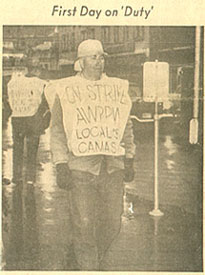
Almost from the start, West coast IBPM and IBPSPMW members criticized their cautious, hierarchical international unions. By the late 1950s, tensions accelerated.

West Coast locals forced the national leadership to push for better pension plans, and dissidents created the Rank and File Movement for Democratic Action to institute democratic reforms and call attention to western member needs. When international union leaders refused to heed their concerns during the 1963-64 bargaining round, westerners formed a rebel union, the Association of Western Pulp and Paper Workers (AWPPW) on May 9, 1964. However, IBPM Local #130 in Camas continued to support its AFL executive board and unlike its brothers and sisters in the region did not embrace the new union.
The [1964] strike lasted two weeks and left a lot of scars that would take a long time to heal. The 1964 strike was the first at Camas since 1917. This strike split family members, relatives and friends. Even the City of Camas, local businesses and police were divided in their feelings of the strike. — Dick Lindstrom, “Local # 5 History”

Union President Bob Cochrane talks about the 1964 strike
AWPPW insurgents organized workers to join the new union and reject the 1964 contract negotiated by IBPSPMW. In September the 49 western mill managers urged their 21,000 employees to reject the new union and maintain their traditional AFL ties. But company interference helped galvanize the West Coast locals (except in Camas) to elect AWPPW to represent them. Management took advantage of the transition and tried to reduce union gains in the 1964 contract. For the first time in 30 years, workers in 48 western mills went on strike. Since many Camas workers remained loyal to the AFL unions, Crown Zellerbach continued running the mill and allowed employees to cross the AWPPW Local #5 picket line. Lasting two weeks, the strike divided workers and the community.
Article: How could a strike happen here? It couldn’t … but we have it